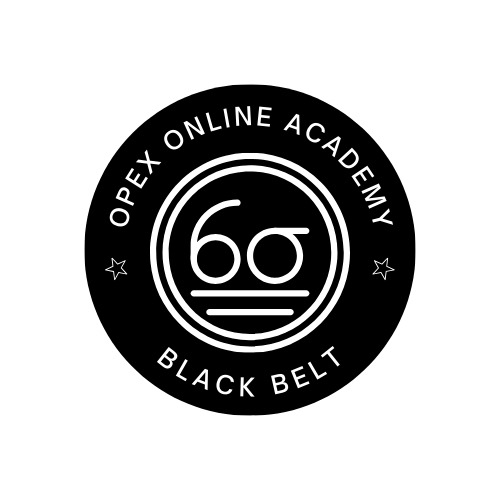
Lean 6 Sigma Black Belt
Accredited Certification by the Council for Six Sigma Certification
$800.00
The Lean 6 Sigma Black Belt certification is a prestigious credential that demonstrates a professional's expertise in process improvement and quality management. This certification provides individuals with the skills to lead complex projects and drive significant operational efficiencies within their organizations.
By combining Lean principles, which focus on waste reduction, with 6 Sigma methodologies that emphasize quality control, Black Belts are trained to analyze data, identify defects, and implement solutions that improve overall performance.
Participants in the certification program gain advanced knowledge of statistical tools and techniques, project management skills, and a deep understanding of organizational dynamics.
Achieving this certification not only demonstrates a commitment to excellence but also opens up new career opportunities in various industries, making it a valuable asset for those seeking to advance their career path.
Have a Lean 6 Sigma Green Belt certification.
Email us at certification@opexonlineacademy.org to validate your certificate if you earned it at another institution or with Opex Online Academy.
How it works:
Enroll in one of our upcoming courses.
Complete the instructor-led virtual training.
Pass the exam, complete your project, and earn your certification.
Black Belt Certification Recognition
Upon completion of the Lean 6 Sigma Black Belt certification, you will be fully capable of designing and implementing improvement initiatives. You will be able to define a business problem, determine the business process baseline, analyze and identify the root cause of the response variable, implement statistical process control charts, improve and optimize process factors, and create a control plan. Additionally, you will be able to initiate a Strategy Deployment Strategy, lead projects from a Kaizen perspective, and manage Change Management strategies.
Course Duration: 40 academic hours
Achieve excellence with Lean Six Sigma certifications for professionals seeking advanced skills.
Who is this certification for?
Individuals and teams seeking to drive operational excellence within their organizations.
Professionals transitioning to transformational leaders.
Leaders seeking to lead complex projects.
What is included?
Training materials.
International lifetime certificate awarded by Opex Online Academy.
Official digital Lean Six Sigma Black Belt badge upon meeting all requirements.
Guided training in Minitab.
What will you learn?Simple Linear Regression
Multiple Linear Regression
Design of Experiments
Full Factorial Design of Experiments
Fractional Factorial Design of Experiments
Hoshin Kanri
Kaizen
Change Management
Learn advanced change agent skills, including:
Correlation
Simple Linear Regression
Nonlinear Regression
Multiple Linear Regression
Confidence and Prediction Intervals
Data Transformation
Design of Experiments
2k Full Factorial Designs
Fractional Factorial Designs
Orthogonal Designs
The Hoshin Kanri Model
The Hoshin Kanri Process
Creating a Kaizen Culture
Change Management
At the end of this program, you will be able to:
Lead improvement projects: challenging the status quo and current work practices.
Stand out as a leader: optimizing solutions to complex problems through the comprehensive use of experimental design.
Qualify for leadership positions: delivering tangible results and generating significant savings.
Enhance your professional credentials: adding this certification to your resume, demonstrating your willingness to grow professionally and contribute to your organization's achievements.
To obtain your Black Belt Certification you must fulfill the following requirements:
COURSE LEVEL CERTIFICATION POLICY
The candidate will have two attempts to pass the exam with a score of 80% or above.
The candidate has 180 days to submit the Lean Six Sigma Project (real or hypothetical) from the moment that the course starts.
The candidate will be issued with the course level certificate after obtaining a score of 80% or above in the exam and when the project has been validated according to the project completion guidelines.
PROJECT COMPLETION GUIDELINES
1. Provide a signed affidavit that attests that the project, either real-life or hypothetical, is the own work of the Candidate.
2. Describe the Six Sigma Project Title
3. Provide a brief description of the purpose of the project, and how it is related to the business objective.
4. Six Sigma project’s start and completion dates by month/year.
5. Provide a brief statement on the benefits achieved by the successful completion of the project.
6. Include the following minimum project deliverables
Define Phase:
Project Charter that includes:
Business Case and Problem Statement.
Critical to X requirements applicable to the project.
Six Sigma Metrics defined for the project.
Financial Indicators applicable to the project
Hard and soft benefits derived from the project implementation
Measure Phase:
Process Definition support documents.
Six Sigma Statistics
Descriptive and inferential statistics are presented wherever required.
Normality of data is assessed.
Measurement Analysis
Gage R&R (variable or attribute)
Capability Analysis
Capability Indices
Analyze Phase:
Sources of Variation
Hypothesis testing analysis
Improve Phase:
Simple or Multiple Regression analysis
Design of Experiments
Full Factorial Experiments OR
Fractional Factorial Experiments
Control Phase:
Lean Controls (if applicable)
SPC Control Charts
Control and Response Plan
Other important points:
There is no minimum length required.
The quality of work will be assessed on the following criteria:
Conclusions are coherent and portray what the data is showing.
The tools chosen are representative of the analysis required to solve the issue.
The problem statement is of strategic importance to the organization that it belongs to.
